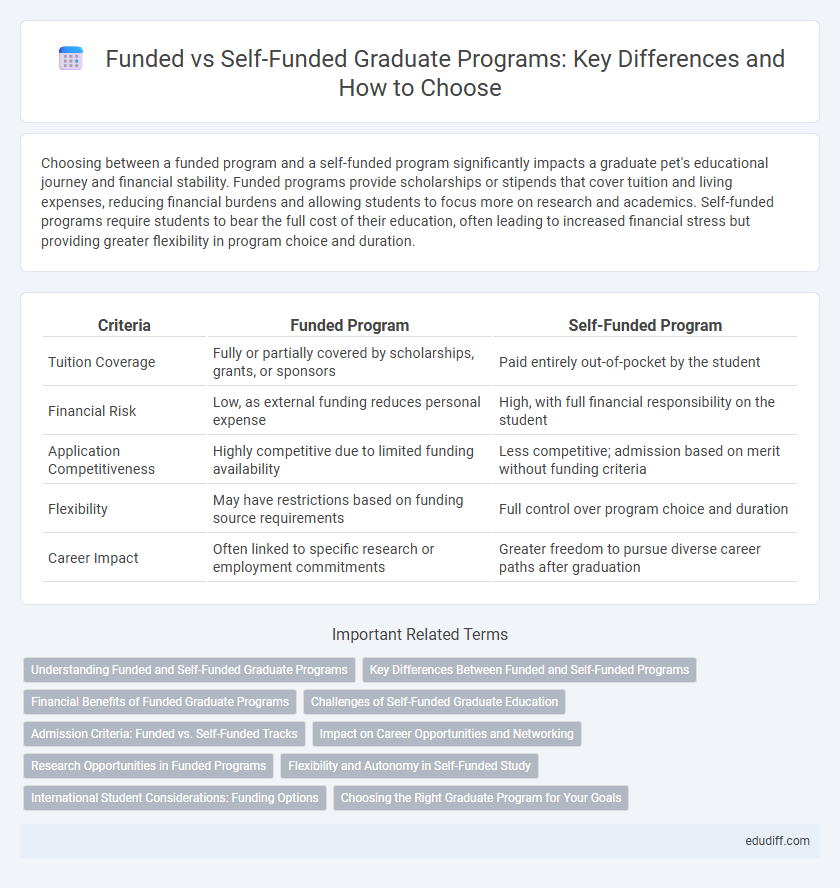Choosing between a funded program and a self-funded program significantly impacts a graduate pet's educational journey and financial stability. Funded programs provide scholarships or stipends that cover tuition and living expenses, reducing financial burdens and allowing students to focus more on research and academics. Self-funded programs require students to bear the full cost of their education, often leading to increased financial stress but providing greater flexibility in program choice and duration.
Table of Comparison
| Criteria | Funded Program | Self-Funded Program |
|---|---|---|
| Tuition Coverage | Fully or partially covered by scholarships, grants, or sponsors | Paid entirely out-of-pocket by the student |
| Financial Risk | Low, as external funding reduces personal expense | High, with full financial responsibility on the student |
| Application Competitiveness | Highly competitive due to limited funding availability | Less competitive; admission based on merit without funding criteria |
| Flexibility | May have restrictions based on funding source requirements | Full control over program choice and duration |
| Career Impact | Often linked to specific research or employment commitments | Greater freedom to pursue diverse career paths after graduation |
Understanding Funded and Self-Funded Graduate Programs
Funded graduate programs provide tuition waivers, stipends, and research assistantships funded by universities or external grants, enabling students to focus fully on their studies without financial strain. Self-funded programs require students to cover tuition and living expenses independently, often balancing part-time work or loans alongside academic commitments. Understanding the distinct financial responsibilities and support mechanisms helps prospective graduate students make informed decisions aligned with their career goals and financial situations.
Key Differences Between Funded and Self-Funded Programs
Funded programs provide financial support through scholarships, grants, or institutional funding, reducing the cost burden on graduates and often including stipends or tuition waivers. Self-funded programs require students to cover all expenses independently, leading to higher out-of-pocket costs but offering greater flexibility in program choice and duration. Key differences lie in financial risk, access to resources, and the level of external support during the academic journey.
Financial Benefits of Funded Graduate Programs
Funded graduate programs provide significant financial benefits by covering tuition fees, offering stipends for living expenses, and sometimes including health insurance, which reduces the financial burden on students. These programs often have teaching or research assistantships that provide a steady income, allowing students to focus fully on their studies without the stress of securing external funding. Compared to self-funded programs, funded programs improve accessibility and reduce student debt, enabling graduates to pursue advanced education with greater financial stability.
Challenges of Self-Funded Graduate Education
Self-funded graduate students often face significant financial strain due to tuition fees and living expenses without institutional support, leading to increased stress and potential academic performance issues. Limited access to scholarships and grants forces reliance on personal savings, loans, or part-time work, which can detract from study time and research opportunities. Unlike funded programs that provide stipends, research assistantships, or tuition waivers, self-funded students must navigate these economic challenges while maintaining their academic progress.
Admission Criteria: Funded vs. Self-Funded Tracks
Admission criteria for funded graduate programs typically prioritize academic excellence, research potential, and alignment with faculty interests to secure scholarships or assistantships. Self-funded programs often have more flexible admission standards, focusing primarily on the applicant's ability to pay tuition rather than competitive academic metrics. Graduate applicants must evaluate these differences to align their credentials with the appropriate funding track.
Impact on Career Opportunities and Networking
Funded programs often provide graduates with greater access to industry connections, mentorship, and exclusive internships, significantly enhancing career opportunities and professional networking. Self-funded programs may limit access to such resources but allow greater flexibility and independence, requiring graduates to proactively build their networks. The structured support in funded programs can lead to faster career advancement and a stronger alumni network.
Research Opportunities in Funded Programs
Funded programs provide graduate students with substantial research opportunities supported by institutional grants, enabling access to advanced laboratories and collaborative projects with faculty experts. These programs often include stipends and tuition waivers, reducing financial barriers and allowing students to focus on innovative research activities. In contrast, self-funded programs may limit research involvement due to financial constraints and fewer resources, impacting the depth and scope of academic exploration.
Flexibility and Autonomy in Self-Funded Study
Self-funded graduate programs offer unparalleled flexibility, allowing students to tailor their course load and schedule according to personal commitments and learning pace. Unlike funded programs with fixed curricula and timelines, self-funded students exercise greater autonomy in choosing electives and research topics that align with career goals. This independence supports customized academic experiences and fosters self-discipline essential for professional development.
International Student Considerations: Funding Options
International students should carefully evaluate funded programs, which offer scholarships or assistantships that cover tuition and living expenses, reducing financial burdens significantly. Self-funded programs require students to independently secure resources, including personal savings, loans, or external scholarships, demanding thorough financial planning. Understanding eligibility criteria, application deadlines, and funding availability is essential to maximize support opportunities for international graduates.
Choosing the Right Graduate Program for Your Goals
Choosing the right graduate program requires evaluating the benefits of funded programs, which often provide tuition waivers and stipends, against self-funded options that offer greater flexibility in program selection and scheduling. Funded programs typically reduce financial burdens and enhance focus on research, making them ideal for students aiming for academic or research-intensive careers. Self-funded programs may suit those prioritizing career changes or specialized skills, allowing investment aligned closely with personal and professional goals.
Funded Program vs Self-Funded Program Infographic

 edudiff.com
edudiff.com